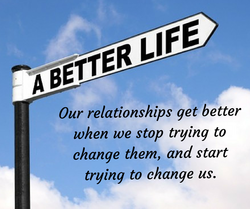P.S. Looking for a way to read Scripture on the go? Download the Bible App (iPhone/iPad or Android). It’s free, easy to use, offers multiple translations, and allows you to add your own bookmarks and highlights.
|
This weekend we kicked off a new message series called Up Close & Personal. It’s all about celebrating the season of Easter by getting to know Jesus better. As we begin this series, it’s helpful to take a moment to reflect on where you are today. How well do you feel like you know Jesus right now? What has formed your impressions about who Jesus is? Teachers? Parents? Friends? Movies? Books? One of the very best ways to get to know Jesus better is through Scripture, particularly through the Gospels. The challenge for this series is to pick one of the four Gospels (Matthew, Mark, Luke, or John) and read it during this series. Today, decide which Gospel you’ll commit to reading over the next few weeks and a time of day when you can devote 10 minutes to reading it. Then, share your plan with others--it’s a powerful way to commit yourself to a goal! Comment below to share your plan and see how others are committing to get to know Jesus better during this series.
P.S. Looking for a way to read Scripture on the go? Download the Bible App (iPhone/iPad or Android). It’s free, easy to use, offers multiple translations, and allows you to add your own bookmarks and highlights.
6 Comments
In our message series, Tough Love, we're exploring what love really looks like, not what love looks like in our dreams or imaginations, but what love really means and requires of us. We're working to understand love not as something we feel, but as something we do. Love is a verb, not a noun, and that means we've got to take action. (If you missed this week's message, you can watch it here.) This week's challenge is to put our love into action in some big or small way through doing good deeds. What's your good deed this week? What's something you wouldn't normally do, but will do out of a commitment to grow in love during this series? Maybe it's something for a friend or neighbor. Maybe it's a good deed for the person you've identified as your "tough to love" person.
No matter what it is, we invite you to share your good deed below, for two reasons:
Share your good deed by commenting below. Feel free to post anonymously if you prefer (enter "Anon" in the Name field; Email and Website can be left blank). If sharing at all feels way outside your comfort zone, you're on the right track. Discipleship is all about growth and growth only happens when we're outside our comfort zones. Thanks for spreading and sharing light!  At some level, we all know this, but maybe it’s not something we’ve thought about much: relationships are so important to our happiness that the quality of our relationships affects our quality of life. This is especially true of relationships with the people we love the most and spend the most time with. If we want to have better lives, one of the surest ways to do this is to work to improve the quality of even one or two of our most important relationships. This week we’ve been looking at St. Paul’s advice on love and relationships, which comes down to one simple principle: focus on what you can do, what you can control--take responsibility for what depends on you in the relationship. If we want a relationship to get better, we need to stop thinking about what the other person should or shouldn’t have said, about how they should change, about what they should do differently. Love doesn’t keep lists of all the ways I’ve been wronged, all the times the other person hurt me. Love doesn’t rush to point out the other person’s faults. Instead of brooding over injuries and keeping lists, instead of seeking its own interests and protecting itself, love tries to find ways to give more. Our relationships get better when we stop trying to change them, and start trying to change us. If you want to take a next step with this week’s message, here are three ideas:
Here’s something to think about: What God sees when he looks at our lives is not always the same as what we see. And at times, the difference between what God sees and what I see can be enormous. I think I know so well what I need and what is best for me--that even if I don’t know much about anything else, surely I must be the expert on my own life--but actually, God is the expert on my life. God’s perspective on my strengths and weaknesses, my joys and challenges, my past and my present and my future, is so much wider and longer and deeper than mine. I’ve got the obstructed view--behind a pole in the nosebleed seats--but God’s in a field box right behind home plate. He can see every play--he knows the story of my life so much better than I do. So if you ask me what I need right now, and you ask God what I need right now, you would probably get two very different responses.
In some way, God is always meeting needs that I don’t know I have and answering questions I haven’t thought to ask. And because I don’t really know what I need, I often have trouble recognizing and accepting what God offers me to fill that need. So many times, I’ve been so focused on the mountain of things I think I need--God’s help with making an important decision, improving a difficult relationship, solving an impossible problem--that I haven’t been able to see past it to get a glimpse of what God is giving me. Only when I am really willing to spend a lot of time in prayer can I sometimes see beyond my mountain of needs. Right now, if I’m really honest, I have to say that what I want God to give me is solutions, but I have a feeling that what God wants to give me is the ability to trust that he’s got it all under control. This pattern of being unaware of what we really need and unable to recognize and accept God’s answer to that need is as old as history, and is woven through all the readings this week. God was leading the Israelites to an amazing future, but they longed to go back to slavery in Egypt. The people were hungry, and God sent bread from heaven, but the people asked, “What is this?” The crowd saw Jesus as a miracle worker who could multiply bread, and did not recognize that he was offering something far greater than bread--the gift of his own self, the gift of a relationship with him. When we are focused on our needs, it is just so hard for us to see what God is doing. One element of growing in our faith is learning to align our vision more and more with God’s vision. With God’s grace, we can begin to see more of what he sees, and begin to sense what he is working on in our lives. We can gradually become less concerned about what we think we need, and more open to receiving what he knows we need. And so much of the time, what we really need is to go deeper in relationship with him. In the end, the things we think we need are like food that perishes, but a real, active, living relationship with the Lord endures for eternal life. ~Rachel Take your next step: Spend a couple of minutes opening your heart to God and telling him what you really want him to give you. Then ask God to give you a glimpse of what he really wants to give you. Share your response by adding a comment here on our blog: What I want God to give me is… But I have a feeling that what God wants to give me is…  When I was very young, my mother used to wake me up in the mornings for school. She used to say that I was always smiling when she came in. I can remember vividly the way I felt most days. Life was pretty carefree back then, full of possibilities and promise. I was well cared for, and had a predictable life filled with family and friends. I didn’t articulate it then, but I felt God’s presence in my life, and even if it wasn’t something I would have described as a relationship, it was something I trusted. I had a peace and a confidence in being, believing that things would be ok no matter what. I feel blessed to have had that experience, because it hasn’t stayed the same. Life gets challenging and complicated, and that peace and trust can get eroded. Many days I wake up with a pit of anxiety in my stomach rather than a smile on my face. I thought about this as I prayed with this Sunday’s gospel. Maybe you remember the story. Jesus is sitting with his friends and looks up to see a large crowd arriving. Knowing already what he was going to do, he asks his friends a really impractical question: “Where can we buy enough food for them to eat?” The practical friends make their calculations and consider their resources and conclude, maybe with a familiar pit of anxiety in their stomachs, that the situation is impossible. Just when the disciples have pointed out the absurd limitations of their ability to respond, Jesus has them tell the people to recline in preparation for a feast. While thousands look on, Jesus takes the food and prays. John says that Jesus “gave thanks.” He acknowledged that the food he held came from God and belonged to God. Once the child handed it over and Jesus gave thanks over it, it was recognized as God’s food, and it was therefore God’s goodness that the crowd was going to share. In so many situations, I have let my practical concerns erode my trust and confidence in what God’s power can accomplish. It usually happens when I’m being pragmatic and believe that I need to fix something or solve a problem. When I think the results depend completely on me, my skills and talents seem inadequate and my anxiety increases. When I put this kind of pressure on myself to be the hero, I lose my balance and forget about that presence of God that I felt so surely in less stressful times. I fail to trust that God’s power is always at work. This doesn’t mean that we can just sit back and wait for God to take care of everything. The miracle in the gospel this week is not explained. We don’t know how it happened. There was suddenly a feast, when there had been so little. It is left as a mystery. What we do know is that God met the needs of the people. God satisfied their hunger, beginning with the generosity of one who apparently had little to offer. How often have I been afraid to act, to make a start at a complicated problem because I felt myself inadequate to the task. These days I have to work so much harder than I did as a child to keep finding that peace and confidence in being that comes from staying in touch with a mysterious relationship with God. But when I do, rather than feeling like it’s all up to me, or that I should wait for some magical solution to appear out of thin air, I can begin to do what I can do, trusting that God is concerned about meeting human needs, and that God can work wonders with what little we have, if we are willing to offer it. With God, inadequacy can be transformed into abundance. ~Fr. Thom Take your next step: Take some time to recall a specific time in your life when you felt peaceful and confident. Be as specific as you can about the details, and try to remember the feeling. Thank God for that time. Think about a challenge or a stressful situation you are facing. Pray that you can trust in God’s power to multiply the results when you make a start by offering what you can. I was talking with a friend who lives in Texas. She was telling me about a friend of hers who runs the classes people need to take in order to get a permit to carry a concealed weapon. She said that in one relatively small town, he is able to profitably fill a class every month. I was astonished to think that there is a growing number of people who have the interest and motivation to actively seek the training required to carry a hidden gun. I am very interested in any growing population, since that is the biggest problem we are facing as a faith community--that we are not growing.
What makes the difference? What nurtures the growth of individuals or communities, and what holds us back? An important question for every person and every community is: what do you envision for your future? The question is different at different stages of the journey. It starts when people ask us as children, “What do you want to be when you grow up?” As we grow, and maybe find ourselves in very different roles doing very different things than we imagined, it becomes more and more important to look to how we are living in the present, since that is what shapes our future. As we look back on the paths our lives have taken, we have a great opportunity to see God’s presence and action along the way. Awareness of the presence of God can reveal new paths, new callings, or new roads that we may never have dreamed of pursuing. I believe that the way to change our shrinking churches into growing churches is to encourage each other to actively engage in reflection on where each of us has seen God’s presence and action in our lives. This leads to a place of gratitude, peace, and confidence in God’s love for each of us. When we dwell in this space, we live life more intentionally and become more authentically who we were made to be, regardless of our occupation or the roles we play. When we see people who embody this kind of joyful spirit, we are attracted, and want to know where it comes from. People who know the joy of God’s love have a way of proclaiming this joy with their lives. I think of the times when I have been privileged to hear people telling stories about when they have experienced God, like when courageous and generous members of our community gave witness talks during Lenten Masses, or on our Confirmation retreats. It is not an easy thing to do, and my experience is that everyone I have ever asked has felt that they didn’t have anything to share and couldn’t do it, but have nevertheless had a powerful impact on their listeners. This is how we begin to create a cultural shift that values and embraces identifying and sharing experiences of God. For us to really grow, the way Jesus envisioned, and the way his early disciples put into practice, it’s up to us to create a culture that values sharing faith, as strong as the Texas culture of gun ownership. It’s so easy to believe that this call is for someone else. We already have busy lives. Or we don’t think we have what it takes, or we don’t think God would be calling us. But the truth is, the story of Jesus sending his disciples out into the world is a blueprint for his plan for transformation of the world, and it is for every one of his followers. Like the twelve, we are supposed to be his emissaries. Perhaps not by going off to foreign lands, but by the way we live our lives now. No matter what our job, each of us has a share in Jesus’s vocation. His instructions to us are simple: preach repentance, heal people, and continue his battle with the powers of evil. Take nothing for the journey; God will provide what you need. What is Jesus calling you to do and to be? ~Fr. Thom Take your next step: Ask someone you know and trust to spend some time thinking and praying about where God has been a part of their lives, and promise to do the same. Set aside some time to tell each other what that was like for you and what you discovered. Has God spoken to you lately? No, really--stop for a minute, and think about it. Has God spoken to you lately? What did God say? For a lot of us, the idea that God would speak to us might seem far-fetched. Maybe it seems like God stopped speaking a long time ago, around the time the Bible was finished. Or maybe it seems like God does still speak to people, but only to saints and visionaries and popes. Or maybe it seems theoretically possible that God is speaking to you personally, but you have no idea how you would know what God is saying. But what if we entertain the far-fetched notion for a moment: what if God really does speak to us all the time, in ways that we can actually understand, if we really want to?
After all, we believe that God created us and loves us and wants to be in relationship with us. What kind of God would create us and love us and want to be in relationship with us, but never speak to us? We believe that God is deeply interested in each of us, in our hopes and fears and dreams. How could God possibly not want to speak to us about those things? So if we haven’t heard God speaking to us lately, maybe it’s not because God hasn’t been speaking, but because we haven’t been listening. One of the things that can get in the way of hearing God is that we get stuck on thinking that if God were to speak to us, it would have to be in some highly dramatic biblical fashion, like a thundering voice from a cloud. This can be a big roadblock--if we’re looking for a voice from a cloud, we’re probably going to miss the ways that God is really speaking to us. God can speak to us through our emotional responses to events and experiences in our lives, through his Word, through the words that people in our lives say to us, through creation, through the sacraments, through the Church, through art and music and literature. God speaks to us all the time in a thousand ways that we can understand, if we really want to. A huge part of listening to God is just paying attention. But it’s also true that sometimes, we don’t listen to God because we don’t really want to hear what God is saying. We’re afraid that we’ll have to change in some way that we’re not really open to, or that God might ask us to do something we’re not prepared to do. So we avoid hearing the word that God is speaking to us by not bothering to pay attention. Maybe deep down we have a gut feeling that we know what God is saying to us through our experiences or through another person, and it’s something we really don’t want to hear. Or maybe we have already decided what we want God to say to us, and we’re only willing to listen if God says the words that we’re trying to put in his mouth. So we resist and rebel, doing the spiritual equivalent of sticking our fingers in our ears and saying, “I can’t hear you!” For me, there was a time in my life when I was very intentionally trying to discern God’s will for me. I wanted God to tell me specifically what kind of work he wanted me to do, so I was spending a lot of time asking, “What do you want me to do, Lord?”, and a lot of time hearing nothing in response. The possibilities that I thought might be God’s will for me didn’t work out, and over the course of several months, I became increasingly frustrated and resentful: here I was wanting to know God’s will so I could live it out, and he wouldn’t even tell me what it was. I kept hammering away and hammering away, until eventually in prayer it occurred to me that maybe “What do you want me to do, Lord?” was not the question God wanted to answer for me right then. It was what I was interested in talking to God about, but maybe it was not what God wanted to talk to me about. So I began to try to listen to God not for an answer to my questions, but for whatever God was trying to say to me. And slowly I began to hear God say, “You don’t need to worry about that right now. Just serve where you are. You don’t need to figure out some grand plan. Just serve the people I put in front of you every day.” I started to hear God saying “Just serve,” in a very strong and comforting way, all the time. In hearing that message and trying to follow it, I felt a sense of peace that I hadn’t known I needed. As it turns out, God has a much better sense of what I need to hear than I do. But I have to keep relearning this lesson over and over again. ~Rachel Take your next step: The Examen is a way of praying developed by St. Ignatius that helps us to grow in our ability to recognize and hear God’s voice. It takes about 10-15 minutes a day. Try praying the Examen every day for a week as a way to become more open to hearing God speak to you.
This week's "take your next step" post is a very brief video (under 2 minutes). Click below to view the video!
 This Sunday we celebrate the solemn feast of the Most Holy Trinity. The doctrine of the Trinity is not easy to grasp and certainly falls into the category of a mystery of our faith. Central to this mystery is relationship. Our God is a community of persons. Whether you think of the persons of the Trinity as Father-Son-Spirit, Creator-Redeemer-Sanctifier, or Lover-Beloved- and the Love between them, the three persons of the Holy Trinity are one God, and they exist in perfect union with one another. Most of us, I suspect, learned at an early age that we are made in the image and likeness of God. If then, this is true, we are meant to be relational and to seek unity with God and with one another. We have heard repeatedly throughout the Easter season, which ended with Pentecost last Sunday, Jesus’s instruction: “Love as I love you.” In Jesus’s teaching, preaching, healing, and forgiving, he consistently sought to unite himself with the persons he encountered and to restore them to union with God. Even when he chastised the disciples or the Pharisees, Jesus was loving them in a way that sought to draw them into union with him. As baptized Christians, we have been incorporated into the relational life of the Trinity and share in the mission of Christ. What are the implications of this? Just as Jesus’s mission focused on drawing those on the margins closer to him; so too, we are charged with reaching out and responding to those who are separated from the Church, those who have become discouraged and disenfranchised. Last week Rachel quoted Pope Francis in her column saying that “we can fear to lose the saved and we can want to save the lost.” That fear can paralyze us by letting it take over, or it can be a starting place in our prayer, asking God to deliver us from our fear and strengthen our resolve to follow in Christ’s footsteps, seeking those who are absent from our midst. Our incorporation into the life of the Trinity and our sharing in the mission of Jesus—that all may be one—make perfectly clear what choice we must make. Let us not fall short of the goal of living out a love based in union with God that seeks to draw others to Christ. Let us make room not only in our benches in church but in our hearts for those who have left us for any reason in the past. As Jesus told us that he was leaving to prepare a place for us, let us prepare a place for our brothers and sisters. Let us put aside the fear that impedes our attempts to make disciples of all people. ~Sr. Kathleen Take your next step: Each day for the next month (or year—whatever it takes!), ask God to give you the courage to reach out to someone you know who has left the Church, to welcome them to join you at Mass. The church throughout all Belmont, Watertown, and Waltham was at peace. Well, OK. The Scriptures don’t actually say “Belmont, Watertown, and Waltham.” Technically the passage says “Judea, Galilee, and Samaria.” That’s who St. Luke was writing to and about, so of course those are the areas he mentions. But we believe that the Word of God is alive and active, speaking to us and our situation today just as surely as it spoke to the earliest Christians. We recognize in this description what God also desires for our community--God wants us to be at peace and consoled by the Holy Spirit, to be built up and growing in numbers, to be worshipping God in all that we do--and we trust that God is present among us, actively working to bring about his vision. It is up to all of us together to try to understand God’s vision, and to recognize what God is currently doing in our community to bring about that vision, so that we can cooperate with God’s action and try not to get in God’s way! One large part of understanding God’s vision for our community is looking at why we exist as a community at all. Like all the other collaboratives formed by Disciples in Mission, the pastoral plan for the Archdiocese of Boston, our collaborative’s purpose is to help our two parishes become better at two things: 1) reaching those who have become disconnected from the Church, and 2) helping those who are already connected to grow as intentional disciples. From the local level to the global level under the leadership of Pope Francis, our Church has been growing in recognition that we must take seriously Christ’s call to seek the lost and to make disciples. There are so many pieces to figuring out what this means on the local level--how will our partnership actually help St. Joseph and St. Luke to respond to Christ’s call more effectively? From worship to sacraments to service to communications, there are so many ways that working together can help our two parishes reach more people and help more people grow, and we have a long way to go in figuring out all the details. One thing that became clear early this year was that the working name for our partnership, “Saints Joseph and Luke Collaborative,” would not help us to reach people who had become disconnected from the Church, who knew of the existence of either St. Joseph Parish or St. Luke Parish but were convinced that Catholic churches had nothing to offer them. In considering this, we were particularly struck by these words from Pope Francis in his September 2013 interview in America magazine: “Instead of being just a church that welcomes and receives by keeping the doors open, let us try also to be a church that finds new roads, that is able to step outside itself and go to those who do not attend Mass, to those who have quit or are indifferent. The ones who quit sometimes do it for reasons that, if properly understood and assessed, can lead to a return. But that takes audacity and courage.” That is exactly what we feel God is calling us to be: a community that finds new roads, new ways of reaching out. We chose the name New Roads Catholic Community (and accompanying logo) for our partnership as a way of signaling this new perspective to those who have become disconnected from the Church--that perhaps there is more to the Catholic Church than they think there is; that if they give us another look, they will find that we have something more relevant and meaningful to offer than they had previously imagined. Our name also signals something important to those of us who are already actively participating in the life of our community: each of us is called to new roads on our individual journey of faith; we are all called to growth and discipleship.
Yes, using a new name and logo takes some getting used to, but as Pope Francis says, journeying down any new road takes audacity and courage. We will have many new roads to travel together as we try to bring about God’s vision of growth for our community, but we are confident that God will be with us. ~Rachel Take your next step: Spend a few minutes reflecting on Pope Francis’s call for “audacity and courage.” As a member of the New Roads Catholic Community, what step might you take to reach someone who has become disconnected from the Church, to help someone grow as a disciple, or to grow as a disciple yourself? Ask God to give you the gifts of audacity and courage to take this step. |
Archives
August 2017
Categories
All
|





 RSS Feed
RSS Feed
 Like us on Facebook
Like us on Facebook Follow us on Twitter
Follow us on Twitter